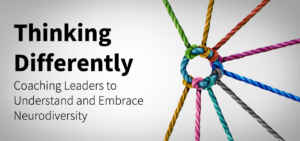
“If everybody is thinking alike, then somebody isn’t thinking” – George Patton
Today, organizations need to think differently about diversity, going beyond race, gender, age, religious belief, and sexual orientation to embrace people with cognitive differences. This article provides recommendations on how leaders must evolve to effectively lead diverse thinking teams and the critical role Executive Coaching can play.
“Neurodiversity” refers to people who think, learn, and behave differently than the norm. Neurodiverse people may have diagnosed conditions like ADHD, Dyslexia, or Autism, or they may simply learn and process differently without a diagnosed condition. This is not a small cohort; Neurodiverse people represent around 20% of the workforce.
As Executive Coaches, we see first-hand how organizations are managing the challenges and reaping the benefits of a cognitively diverse workforce. Organizations that embrace Neurodiversity and appropriately evolve leadership practices will have a competitive advantage. Importantly, this will require both Neurotypical and Neurodiverse leaders to think differently.
Whether you are Neurotypical or Neurodiverse, leaders have always needed to understand people as individuals. Yet, this is even more true with Neurodiverse team members because differences in brain wiring are not necessarily immediately visible or perceptible to others. Therefore, leaders need to work even harder to build empathy with people and how their brains work. They need to do this with the spirit of generosity and support, without creating stigma, judgment, or labels. They need to see cognitive differences as welcomed strengths rather than issues that need to be fixed. Leaders need to create environments where these preferences can emerge organically and be discussed openly. Then leaders can find ways to support people in areas like work environment, communication needs, or social aspects of work that may be different from how they support Neurotypical people.
Furthermore, leaders need to consider how roles are designed and look for ways to provide an even better fit for cognitive diversity. In many cases, role descriptions (often written by Neurotypical managers) may overplay softer interpersonal or relationship-building capabilities that may not be mission-critical. Leaders may also want to consider creating pods of specialization to complement more general roles to acknowledge and leverage differences. They can then identify different career paths, some of which may lead to the C-suite, while others may not.
One of the opportunities or challenges in managing this talent is to ensure that career paths are customized in such a way that how someone’s brain works differently is used to optimal effect for that person and their organization in a way that has not been done often in the past. This is likely to alter accepted career trajectories and leadership competencies.
But what about Neurodiverse leaders themselves?
They also need to start at a deeply personal place. They need to deepen their self-awareness. They need to recognize the situations that bring out their unique superpowers and those that bring frustration for them and others. They need to share these insights openly and proactively with their teams. Together, they can build different organizational muscles with complementary powers that support the overall effort.
Critically, Neurodiverse leaders need to assess their capabilities in the broader organizational context and have courageous conversations about where they add the most value today and where they can expand in the future.
How can Executive Coaches help?
We work with Neurodiverse teams every day; some examples of how coaching can enable breakthroughs for cognitively diverse teams include:
1.Enhancing Self-Awareness: We help both Neurotypical and Neurodiverse leaders achieve deeper levels of understanding through objective and subjective feedback and action planning. We facilitate high-trust conversations to help leaders internalize difficult messages and emerge with positive energy.
2.Communication: We work with leaders to develop communication rituals and messages that can be easily digested by people that process information differently. We help leaders improve comprehension of verbal and non-verbal social cues.
3.Problem-Solving: We facilitate work sessions that use structured tools to help diverse teams tackle complex problems and emerge with common understanding and alignment.
4.Stress Management and Resilience: We give leaders a non-judgmental space to express frustrations and build individualized techniques to manage work stress in the moment.
5.Courageous Conversations: We help individuals and teams create safe spaces where people can learn more about each other. We help teams tackle dysfunction through deeper understanding, allowing them to design improved ways of working.
We believe Neurodiverse people are already bringing outsized benefits to businesses, but realizing their full potential will require thinking differently. As Executive Coaches, we are thinking partners to Neurotypical and Neurodiverse clients. All leaders need to challenge themselves to lead more inclusively in this context. Executive Coaching can play a key part in how organizations improve leadership practices to unleash the power of teams with different cognitive backgrounds.
Do you want to explore further? Feel free to reach out!
Barton.Warner@theprestonassociates.com
Luciana.Nunez@theprestonassociates.com